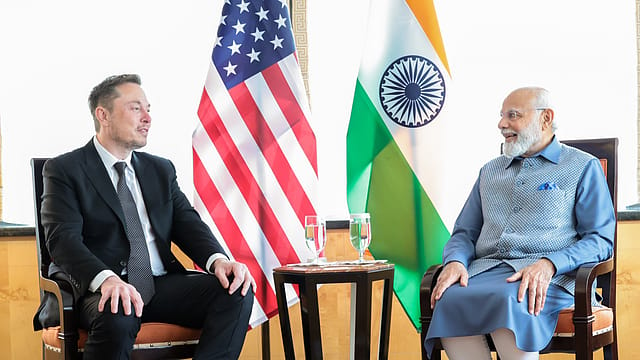As Tesla eyes ‘natural progression’ towards India, Musk set to meet PM Modi this month
ADVERTISEMENT

As the race for electric vehicle (EV) market domination in the world's third-biggest auto market, i.e. India gets hotter, EV giant Tesla chief executive and mega-billionaire Elon Musk seems to be ready to make the final push to fulfil his long-held promise of making entry into the country.
If reports are to be believed, Musk is all set to meet with Prime Minister Narendra Modi as early as this month in India. The Tesla CEO, as reported by a global news agency citing sources, is planning an India visit this month and will announce a major investment for Tesla's new factory here.
If that happens, it'll be Musk's third meeting with PM Modi. They both met in June 2023 in New York and before that in 2015 at Tesla’s Fremont Factory in California. Musk, while speaking with Nicolai Tangen, CEO, Norges Bank Investment Management, on X Spaces this week, had also said that India should have electric cars just like every other country.
"India is now the most populous country in the world, based on population. It's a natural progression to provide Tesla electric vehicles in India," says Musk.
Tesla is reportedly looking at investing around $2-3 billion in initial investment in India and is currently scouting for suitable locations, with Maharashtra and Gujarat being the frontrunners.
In the wake of the global push for EV cars, India also unveiled a new policy in March 2024, slashing import duty, with some riders, to 15% from 100% for certain models.
The new policy says the auto manufacturers are required to invest a minimum amount of ₹4,150 crore or $500 million, with no cap on maximum investment. The government has given a three-year timeline to automakers for setting up new manufacturing facilities in India, and starting commercial production of EVs, and reaching 50% domestic value addition (DVA) within 5 years at the maximum.
The customs duty of 15% (as applicable to CKD (completely knocked down) units) would be applicable on vehicles of minimum CIF (cost, insurance and freight (value of $35,000 and above for a total period of five years subject to the manufacturer setting up manufacturing facilities in the country within three years.
Notably, to give a boost to EV production, the government in March, had also unveiled the new Electric Mobility Promotion Scheme 2024, with a total outlay of ₹500 crore for electric two-wheelers and three-wheelers. The new scheme will run for four months from April 1, 2024, to July 31, 2024. India's expanding electric vehicle industry was seeking an extension of the FAME scheme.
As per the government estimates, India's EV market is expected to grow to 10 million units annually by 2030 and create 50 million jobs.
The EV market is expected to reach $266 billion by 2030. India currently has more than 400 EV start-ups.
Additionally, as the technology progresses, EV cars are set to get expensive. “By 2027, next-generation battery electric vehicles (BEVs) will, on average, be cheaper to produce than a comparable internal combustion engine (ICE),” according to American technological research firm Gartner.